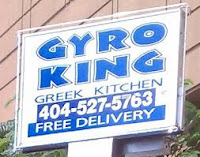Here is the second of two surveys of recent trademark cases filed in Georgia District Courts.
Tory Burch Sues Alleged Counterfeiter
On May 31, 2013, River Light V, L.P. and Tory Burch LLC (collectively “Tory Burch”), both based in New York, New York, filed suit against Golden Stella, Inc. (“Golden Stella”) and Jay Eun (“Eun”) (collectively “Golden Stella”), both based in Atlanta, Georgia, alleging trademark counterfeiting, trademark infringement, trademark dilution, copyright infringement, and unfair competition.
 Tory Burch, known for high quality women’s clothing and accessories, is the exclusive owner of the trademark rights to the logo shown on the right and variations thereof. According to the complaint, the company maintains strict quality control standards for all of their products and spends substantial resources marketing their unique goods. Tory Burch alleges that Golden Stella manufactured handbags and jewelry with a copied Tory Burch Trademark and then sold these counterfeit goods to the public in stores and online.
Tory Burch, known for high quality women’s clothing and accessories, is the exclusive owner of the trademark rights to the logo shown on the right and variations thereof. According to the complaint, the company maintains strict quality control standards for all of their products and spends substantial resources marketing their unique goods. Tory Burch alleges that Golden Stella manufactured handbags and jewelry with a copied Tory Burch Trademark and then sold these counterfeit goods to the public in stores and online.
Tory Burch alleges that Golden Stella’s reproductions are likely to cause confusion or mistake and could damage Tory Burch’s reputation for quality products. Tory Burch alleges that, due to their extensive sales and marketing nationally and abroad, its marks have received widespread recognition, to which Golden Stella is unfairly reaping the benefits. Tory Burch asks the Court to enjoin Golden Stella from using their Trademarks in any manner and award them the profits Golden Stella received by using the Tory Burch marks.
The case is River Light V, L.P. v. Golden Stella, Inc. et al., Case No. 1:13-cv-01839-TCB, United States District Court for the Northern District of Georgia, Atlanta Division, and is assigned to Judge Timothy C. Batten.
Gyro Kings Fight for the Throne
On June 15, 2013, Gyro Enterprises, LLC d/b/a Gyro King (“Gyro Enterprises”), based in Atlanta, Georgia, filed a trademark and service mark infringement action against Gyro King Limited, Nabil A. Saleh and Stylianos Michael Kyriacou (collectively “Gyro King”), based in Atlanta, Georgia. Both businesses specialize in providing Greek cuisine, such as gyros, chicken wraps and pitas, falafel wraps, and other Greek inspired dishes.
 Gyro Enterprises obtained the registered trademark GYRO KING on May 21, 2013, a mark Gyro Enterprises claims that it or its predecessor has owned since 2008. Gyro Enterprises alleges that after opening its business, the now owner of Gyro King asked whether the Gyro Enterprises owners would help train him in preparing Greek cuisine, which it agreed to do. Since that time, Gyro King has opened four Greek restaurants in the greater Atlanta area. Gyro Enterprises believes that the unauthorized use of its name will likely cause confusion and deceive customers into thinking the Gyro King restaurants are associated with Gyro Enterprises restaurants.
Gyro Enterprises obtained the registered trademark GYRO KING on May 21, 2013, a mark Gyro Enterprises claims that it or its predecessor has owned since 2008. Gyro Enterprises alleges that after opening its business, the now owner of Gyro King asked whether the Gyro Enterprises owners would help train him in preparing Greek cuisine, which it agreed to do. Since that time, Gyro King has opened four Greek restaurants in the greater Atlanta area. Gyro Enterprises believes that the unauthorized use of its name will likely cause confusion and deceive customers into thinking the Gyro King restaurants are associated with Gyro Enterprises restaurants.
Gyro Enterprises asserts that Gyro King’s use of their mark violates Sections 32 and 43 of the Lanham Act, by infringing on a federally registered mark and engaging in unfair competition, respectfully. It asks the Court to enter judgment that Gyro King has infringed its rights to the GYRO KING trademark and to enjoin Gyro King from further use of the mark.
The case is Gyro Enterprises LLC v. Gyro King Ltd. Case No. 1:13-cv-02011-JEC, United States District Court for the Northern District of Georgia, Atlanta Division, and is assigned to Judge Julie E. Carnes.
American Deli Seeks TRO Against Alleged Infringer
On July 10, 2013, American Deli International, Inc. and American Deli Plus, Inc. (collectively “American Deli”), with a principle place of business in Riverdale, Georgia, filed suit against Jay & Young Group, LLC, (“JYG”) located in Stone Mountain, Georgia, two officers of JYG, three managers of the allegedly infringing restaurant and the original owner of the restaurant, claiming trademark infringement, unfair competition and false designation arising under sections 32 and 43 of the Lanham Act.
 American Deli is a fast food type restaurant operated by licensed franchisees that serves chicken wings, chicken fingers, French fries, sandwiches, salads, etc. According to the complaint JYG is not an American Deli franchisee, however is operating as such, using American Deli proprietary marks. American Deli claims that JYG has acted with the intention of replicating the American Deli restaurants, causing customer confusion and dilution of the distinctive quality of their registered marks. In fact, a quick Google search of the Stone Mountain location offers the correct address, however with a link to the American Deli franchise website.
American Deli is a fast food type restaurant operated by licensed franchisees that serves chicken wings, chicken fingers, French fries, sandwiches, salads, etc. According to the complaint JYG is not an American Deli franchisee, however is operating as such, using American Deli proprietary marks. American Deli claims that JYG has acted with the intention of replicating the American Deli restaurants, causing customer confusion and dilution of the distinctive quality of their registered marks. In fact, a quick Google search of the Stone Mountain location offers the correct address, however with a link to the American Deli franchise website.
One day after filing the complaint, American Deli filed a motion for temporary restraining order, asking the Court to stop JYG from continuing to operate their business until the matter had been addressed. A hearing on the TRO motion was scheduled for July 12, but the Plaintiff voluntarily cancelled the hearing. JYG did not file a response to the TRO motion within the time prescribed by the Local Rules, so the motion has been submitted to Judge Jones for consideration.
The case is American Deli Int’l, Inc. v. Jay & Young Group, LCC, Case No. 1:13-cv-02302-SCJ, United States District Court for the Northern District of Georgia, Atlanta Division, and is assigned to Judge Steve C. Jones.
Yanmar Targets Grey Market Tractors
On July 22, 2013, Yanmar America Corporation (“YAC”), based in Adairsville, Georgia, filed a complaint against Anthony Mills, individually, and d/b/a Mei Farm Equipment (“Defendant”), based in Elberton, Georgia, for trademark infringement under Sections 42 and 43(b) of the Lanham Act (Importation of Goods Bearing Infringing Marks), and Section 43(a) of the Lanham Act (False Designation of Origin).
 YAC is a subsidiary of Yanmar Company Limited (“YCL”), a Japanese corporation that develops and distributes diesel engines. YCL manufactures tractors in Japan for several different markets including the U.S. The tractors produced for the U.S. market are materially different in design and standards than those produced for the Japanese market, therefore, the tractors made for the Japanese market are not intended for sale in the U.S. YAC claims that the Defendant unlawfully imported and distributed Japanese market tractors in the U.S. (“grey market” tractors), which causes consumer confusion as well as significant safety concerns. YAC asks that the Court enjoin the Defendant from continuing to infringe on their trademark as well as open them up to possible products liability exposure.
YAC is a subsidiary of Yanmar Company Limited (“YCL”), a Japanese corporation that develops and distributes diesel engines. YCL manufactures tractors in Japan for several different markets including the U.S. The tractors produced for the U.S. market are materially different in design and standards than those produced for the Japanese market, therefore, the tractors made for the Japanese market are not intended for sale in the U.S. YAC claims that the Defendant unlawfully imported and distributed Japanese market tractors in the U.S. (“grey market” tractors), which causes consumer confusion as well as significant safety concerns. YAC asks that the Court enjoin the Defendant from continuing to infringe on their trademark as well as open them up to possible products liability exposure.
In 2012, YAC and YCL were involved in litigation after a 1977 grey market tractor was sold to an individual in the U.S. by a company who had purchased the tractor from another company who imported these grey market tractors. Those tractors are not intended for US terrain, and unfortunately rolled over and killed the man operating it, leading to his wife filing suit. Ultimately the Supreme Court of Arkansas determined there was no personal jurisdiction over YCL. The Court also determined that YAC owed no duty to the deceased because YAC was not involved in importing the tractor into the U.S. or in the design and manufacture of the tractor.[1]
Due to cases like this, YAC emphasizes to the court the importance of not allowing importation of tractors intended for the Japanese market. Therefore, YAC asks the Court to enjoin the Defendant from importing the tractors and to order them to notify each of their previous purchasers of the material differences between the Japanese and US market tractors.
The case is Yanmar America Corp. v. Anthony Mills, Case No. 1:13-cv-00081-CAR, United States District Court for the Middle District of Georgia, Athens Division, and is assigned to Judge C. Ashley Royal.
Emily Scheible also contributed to this article.
[1] Yanmar Co., Ltd. v. Slater, 2012 Ark. 36 (Ark. 2012).




 />i
/>i
